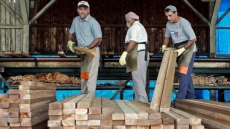VANCOUVER — Doctors with opposing views on whether medical marijuana should be prescribed for various conditions agree on one thing: their profession is ill-prepared to deal with patients asking for a drug that lacks adequate clinical research.
Two doctors with contrasting viewpoints on the issue will participate in a debate on Tuesday — the day before recreational cannabis is legalized — as part of a live streamed event hosted by the College of Family Physicians of Canada.
Dr. Mark Ware, who practises pain medicine in Montreal and has spent 20 years researching chronic pain, will be arguing for the use of medical cannabis for conditions such as neuropathic pain and chemotherapy-induced nausea and vomiting.
On the other side, Dr. Mel Kahan, medical director of Substance Use Services at Women's College Hospital in Toronto, believes the overall evidence for medical marijuana is "incredibly weak."
Ware, who has taken a leave from his job to work as chief medical officer for Ontario-based medical marijuana company Canopy Growth Corp., said most of the research on cannabis in the last 40 years has focused on recreational use and physicians aren't taught even the basics of the drug as part of their training.
He and some colleagues have tried developing an educational program for medical schools "but even those run into challenges because the evidence base is limited so we have challenges getting them through education program reviews," Ware said.
"It's a tough situation. I empathize with the practising clinicians who may sit and feel they don't have much information," he said, adding the neuroscience of cannabinoid pharmacology is "extremely robust."
"I think with recreational cannabis coming on stream patients are now going to come and talk about cannabis for a wide range of reasons."
However, Kahan, who is also an associate professor in the department of family medicine at the University of Toronto, said very few controlled trials have been done on cannabis, adding the drug has not been found to be useful for anxiety and post-traumatic stress disorder despite some claims, and may well worsen such conditions.
"THC has been shown in pre-clinical studies to cause anxiety," he said, referring to tetrahydrocannabinol, the main psychoactive ingredient found in cannabis. "So I think a lot of the claims are false."
"We have to understand that there's a greedy and dishonest industry," he said of the proliferation of marijuana clinics.
"It's Cowboyland out there right now. You can prescribe marijuana for anything you want, regardless of the evidence," he said. "As far as I can tell many of them are prescribing very high doses for all sorts of conditions: arthritis and anxiety etcetera. And this is dangerous. Sure, if they prescribe judiciously and carefully to people with true, organic pain conditions that's OK."
The Canadian Medical Association maintains that while some patients may benefit from medical cannabis, many doctors feel uncomfortable prescribing a substance that hasn't undergone the same regulatory review processes required for all other prescription medicines to provide physicians with information about dosages and potential interactions with other drugs.
Health Canada said in an emailed response that the department "recognizes the concerns regarding the level of evidence on the risks and benefits of cannabis for medical purposes, as well as on dosage and potential interactions with other medications."
It says new regulations coming into effect on Wednesday permit "research activities" and support pre-clinical and clinical research on the use of cannabis and cannabinoids for medical purposes.
Provincial and territorial medical regulatory authorities have put medical marijuana policies in place for doctors.
For example, the College and Physicians and Surgeons of British Columbia has advised doctors that cannabis is not generally appropriate for anyone who is under 25, has an active substance use disorder, a personal or strong family history of cannabis use disorder, cardiovascular or respiratory disease and is pregnant, planning to become pregnant or is breast feeding.
Patients who have medical authorization for cannabis from a doctor may access cannabis by registering with a licensed producer, at least 130 of which exist across the country, or by registering with Health Canada to produce a limited amount for their own purposes or by designating someone to grow it for them.
Canada began providing limited legal access to dried marijuana starting in 1999, before patients could possess it with a doctor's authorization for medical purposes starting in 2001.
As of June, more than 330,000 Canadians were registered with Health Canada-approved licensed producers as users of medical marijuana.
Dr. Mike Allan, director of programs and practice support at the College of Family Physicians of Canada, will moderate the debate between Ware and Kahan.
Allan said patients should consider the potential side effects of cannabis, the same as with any other "natural" drug they may take.
"Many will claim that because they're natural they're adverse-event free but that's just not the case. There are a lot of natural products that have adverse events and cannabinoids are one of them."
Money generated from cannabis should go toward research to better understand its potential benefits and harms, he said.


